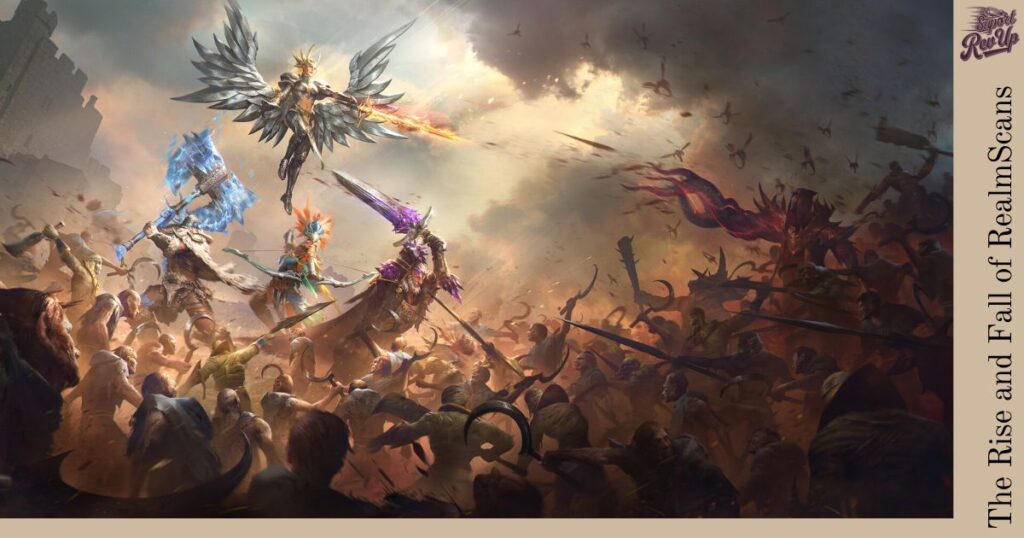In the ever-evolving world of manga consumption, a significant chapter has come to a close. RealmScans, a prominent player in the manga scanlation scene, has officially ended its journey, leaving a void in the hearts of many manga enthusiasts.
This departure marks a pivotal moment in the landscape of manga translation and distribution, prompting us to reflect on the impact of fan-driven initiatives and the future of manga accessibility in the West.
What Happened to RealmScans?
RealmScans’ announcement sent shockwaves through the manga community, catching many readers off guard. The group, known for its swift translations and diverse catalogue of manga titles, cited increasing legal pressures and a desire to respect intellectual property rights as primary reasons for their closure.
The timeline leading to RealmScans’ closure reveals a gradual increase in cease-and-desist letters from publishers and heightened scrutiny of unofficial translations. As the manga industry has grown more aware of the global appetite for their content, efforts to crack down on unauthorized distributions have intensified.
Initial reactions from fans ranged from disbelief to understanding. Many expressed gratitude for RealmScans’ contributions, while others worried about the fate of ongoing series translations.
The closure sparked heated discussions across forums and social media platforms, highlighting the deep connection readers had formed with this unofficial yet beloved source of manga content.
- More Post: After Movies In Order: A Comprehensive Guide
Understanding Manga Scanlation
To grasp the significance of RealmScans’ departure, it’s crucial to understand the world of manga scanlation. Scanlation, a portmanteau of “scan” and “translation,” refers to the practice of scanning, translating, and editing manga from its original language (usually Japanese) into other languages, typically English.
This fan-driven process has been a cornerstone of the global manga community for decades, often bringing titles to international readers long before official translations become available.
Scanlation operates in a legal gray area. While it undeniably infringes on copyright laws, it has also played a significant role in popularizing manga outside of Japan. Many argue that scanlation groups like RealmScans have served as unofficial ambassadors for the medium, introducing readers to series that might otherwise never reach a global audience.
RealmScans fit into this ecosystem as a respected and reliable source for fan-translated material. Their approach to manga scanlation set them apart: they prioritized speed without sacrificing quality, often releasing translations within hours of a chapter’s Japanese release.
This quick turnaround, combined with a vast library of titles spanning various genres, made RealmScans a go-to platform for manga enthusiasts seeking the latest content.
The Rise and Fall of RealmScans: A Brief History

RealmScans’ journey from a small group of passionate fans to a major player in the scanlation scene is a testament to the power of community-driven initiatives.
Founded by a handful of manga lovers frustrated with the lack of timely translations for their favorite series, RealmScans quickly gained traction due to its commitment to quality and speed.
In its early days, RealmScans focused on lesser-known titles, filling a niche that official translators often overlooked. As their reputation grew, so did their ambition.
They expanded their catalogue to include popular titles, always striving to balance widely read manga with more obscure gems. This approach endeared them to a broad spectrum of readers, from casual fans to die-hard otaku.
Key milestones in RealmScans’ history include their translation of several series that went on to become global phenomena. Their work often preceded official releases by months or even years, effectively serving as a litmus test for a title’s potential popularity in the West.
This unofficial market research inadvertently benefited publishers, highlighting series ripe for official localization.
However, success came with increased scrutiny. As RealmScans grew, so did the attention from copyright holders and official distributors.
The group found itself walking an increasingly thin line between serving the fan community and respecting intellectual property rights. Despite attempts to navigate these choppy legal waters, the pressure ultimately became too great to bear.
Figuring Out What RealmScans Left Behind
The void left by RealmScans’ departure is multifaceted. Most immediately, fans are concerned about the fate of ongoing series translations. Many readers had come to rely on RealmScans for their weekly manga fix, and the sudden cessation of these translations has left numerous storylines hanging in limbo.
Beyond unfinished series, RealmScans leaves behind a legacy of community resources and translation tools. Over the years, they had developed a robust infrastructure for manga scanning, translation, and distribution.
This included custom software for image cleaning and typesetting, as well as a network of volunteer translators and editors. The loss of these resources represents a significant setback for the broader scanlation community.
Perhaps most significantly, RealmScans’ closure leaves a void in the scanlation scene itself. Their departure creates an opportunity for other groups to step up, but it also raises questions about the sustainability of the current scanlation model.
As legal pressures mount and official translations become more readily available, the role of scanlation groups is evolving. The community now faces the challenge of adapting to this changing landscape while preserving the spirit of accessibility and passion that drove RealmScans and groups like it.
The Problems and Legal Issues That Come Up With RealmScans

The closure of RealmScans brings to the forefront the myriad legal and ethical issues surrounding manga scanlation. At its core, scanlation involves the unauthorized reproduction and distribution of copyrighted material.
While many fans argue that scanlation serves as free promotion for manga titles, copyright holders and publishers see it as a direct threat to their intellectual property rights and potential revenue streams.
RealmScans, like many scanlation groups, operated in a constant state of legal uncertainty. The threat of DMCA takedown notices and cease-and-desist letters was ever-present. As the group grew in popularity, it became an increasingly visible target for copyright enforcement.
The legal risks extended beyond the group itself to individual volunteers, many of whom contributed their time and skills anonymously to avoid potential repercussions.
The ethical debates within the manga community regarding scanlation are equally complex. While many readers appreciate the quick access to new chapters and the discovery of obscure titles, others argue that scanlation undermines the official manga industry.
This can potentially lead to decreased support for creators and fewer resources for official translations. RealmScans’ situation highlights the delicate balance between fan enthusiasm and respect for creators’ rights, a balance that becomes increasingly difficult to maintain as the manga industry globalizes.
Legacy and Cultural Impact That Lasts
Despite the legal and ethical controversies, it’s undeniable that RealmScans has left an indelible mark on the manga landscape. Their contributions to manga accessibility cannot be overstated.
For many readers, RealmScans served as a gateway to the vast world of manga, introducing them to series and genres they might never have encountered through official channels alone.
The group’s influence extended beyond mere translation. RealmScans set new standards for quality and speed in the scanlation community. Their rapid turnaround times and attention to detail raised the bar for what readers could expect from fan translations.
This, in turn, put pressure on official translators to improve their own processes and release schedules.
Perhaps most significantly, RealmScans played a crucial role in shaping fan expectations and reading habits. The immediacy of their releases fostered a culture of instant gratification among manga readers, who came to expect new chapters of their favorite series within hours of the Japanese release.
This shift in consumer behavior has had lasting implications for the manga industry, influencing how official publishers approach digital distribution and release schedules.
Insights for Reflection
The journey of RealmScans offers valuable lessons for both the manga community and the broader media landscape. It demonstrates the power of passionate fans to drive cultural exchange and content distribution, often outpacing official channels in speed and reach.
RealmScans’ story underscores the delicate balance between fan passion and creator rights. While scanlation groups argue that their work promotes manga and benefits creators in the long run, the legal and ethical implications cannot be ignored.
The challenge moving forward will be finding ways to harness the enthusiasm and efficiency of fan communities while respecting intellectual property rights and ensuring fair compensation for creators.
The evolving relationship between fans and the manga industry is another key takeaway. RealmScans’ closure is part of a broader trend of increased collaboration between publishers and fan communities.
Some publishers have begun to embrace fan translators, offering them official roles or using scanlation sites as proving grounds for new titles. This shift suggests a potential future where the line between official and unofficial content becomes increasingly blurred.
RealmScans Closing and Manga Scanning Rising

As one door closes, another opens. The void left by RealmScans has created opportunities for new groups to emerge and existing ones to expand their reach. This transition period has seen a flurry of activity in the scanlation community, with groups jockeying for position and readers seeking new sources for their manga fix.
Innovations in scanlation techniques and distribution methods are also on the rise. Some groups are experimenting with machine learning for initial translations, while others are developing more sophisticated content management systems to streamline their workflows.
The ongoing demand for fan translations remains strong, despite the increasing availability of official releases. This persistent appetite for scanlated content speaks to the unique value that fan-driven initiatives bring to the table.
Whether it’s the sense of community, the diversity of available titles, or simply the thrill of reading the latest chapters as soon as possible, scanlation continues to fill a niche that official channels have yet to fully address.
The Rising Popularity of Manga Scanlation
The closure of RealmScans comes at a time when manga scanlation is experiencing unprecedented popularity. Several factors are driving this growth, including the global rise of anime streaming services, increased mainstream acceptance of manga and anime culture, and the accessibility afforded by digital platforms.
Scanlation has had a profound impact on global manga readership. It has allowed fans from around the world to engage with content simultaneously, fostering a truly international community of manga enthusiasts.
This globalization of manga fandom has, in turn, influenced the industry itself, with publishers paying more attention to international markets and fan preferences.
However, the expanding scene also faces significant challenges. As scanlation grows more popular, it attracts more attention from copyright holders and legal entities. Groups must navigate an increasingly complex legal landscape while trying to meet the demands of a growing and diverse readership.
Exploring Various Genres in Manga Scanlation
One of RealmScans’ most significant contributions to the manga community was its role in genre diversification. While many scanlation groups focus primarily on popular shonen titles, RealmScans cast a wider net, bringing attention to lesser-known genres and niche series.
This approach to genre exploration had a ripple effect throughout the manga ecosystem. Readers were exposed to a broader range of storytelling styles and themes, expanding their tastes and creating demand for more diverse official releases.
Scanlation groups like RealmScans effectively served as curators, introducing Western audiences to genres that might otherwise have remained confined to the Japanese market.
RealmScans’ legacy in this area continues to influence the scanlation scene. Many groups have taken up the mantle of genre diversity, ensuring that fans have access to a wide range of manga beyond the mainstream hits.
This ongoing commitment to variety keeps the manga landscape vibrant and ensures that there’s something for every reader, regardless of their preferences.
Maintaining Sustainability and Standards in Manga Scanlation
The closure of RealmScans has prompted serious discussions within the scanlation community about sustainability and ethical standards. Many groups are reevaluating their practices, seeking ways to continue their work while minimizing legal risks and respecting creators’ rights.
Some groups have adopted more stringent ethical guidelines, such as removing scanlations once official translations become available or focusing exclusively on titles without official English releases. Others are exploring partnerships with indie manga creators or doujinshi artists, translating works with the explicit permission of the creators.
Balancing speed, quality, and respect for creators remains a central challenge. The pressure to release translations quickly often conflicts with the desire to produce high-quality work and the ethical imperative to support official releases. Finding this balance is crucial for the long-term viability of scanlation as a practice.
Collaboration between fans and official channels is emerging as a potential solution. Some publishers have begun to embrace the scanlation community, hiring fan translators or using scanlation sites as testing grounds for new titles.
The Future of Reading Manga
As we look to the horizon, the landscape of manga consumption continues to evolve. Digital platforms and subscription models are becoming increasingly prevalent, offering readers legal access to a wide range of titles. These official channels are adapting to meet the speed and convenience that fans have come to expect from scanlation sites.
Artificial intelligence and machine translation are poised to play a significant role in the future of manga distribution. While current AI translations often lack the nuance and cultural understanding of human translators, rapid advancements in this field could dramatically alter the dynamics of both official and unofficial translations.
One of the key challenges moving forward will be preserving the community aspect that made sites like RealmScans so beloved. Official platforms are exploring ways to incorporate social features, discussion forums, and fan engagement tools to recreate the sense of community that scanlation sites fostered.
Finding Lesser-Known Facts About RealmScans
Behind the scenes, RealmScans was more than just a website – it was a community of passionate individuals dedicated to sharing their love of manga.
Former team members have shared stories of sleepless nights spent racing to translate the latest chapter, heated debates over the correct interpretation of a particularly tricky passage, and the camaraderie that developed among volunteers who never met in person.
RealmScans was known for its innovative approaches to scanlation. They experimented with various translation tools and image processing techniques, always seeking to improve the quality and speed of their releases.
Some of their methods have since been adopted by other groups, becoming standard practice in the scanlation community.
Perhaps one of RealmScans’ most significant hidden contributions was their role in discovering and promoting manga that went on to become international hits.
Several series that are now household names in the anime and manga community first gained traction through RealmScans’ translations, long before they caught the attention of official publishers.
Similar Sites Like RealmScans
For readers looking to fill the void left by RealmScans, several alternatives exist, both official and unofficial:
- MangaDex: A popular scanlation aggregator site that hosts translations from various groups.
- MangaPlus by SHUEISHA: An official platform offering simultaneous release of many popular manga titles.
- Webtoon: While primarily focused on Korean manhwa, it also features a growing selection of manga and original English-language comics.
- Crunchyroll Manga: A subscription-based service offering a large library of officially licensed manga.
- ComiXology: Amazon’s digital comics platform, which includes a substantial manga selection.
Conclusion
The closure of RealmScans marks the end of an era in manga scanlation, but it also heralds the beginning of a new chapter in the ongoing story of manga distribution and fan engagement. As we reflect on RealmScans’ impact and legacy, we’re reminded of the passion that drives the manga community and the complex interplay between fan initiatives and industry practices.
Looking ahead, the future of manga consumption is likely to be shaped by a combination of official digital platforms, innovative distribution methods, and evolving relationships between fans and publishers. While the legal and ethical challenges surrounding scanlation remain, the spirit of accessibility and community that groups like RealmScans embodied continues to influence how we engage with manga.
FAQs
Q1: Why did Realm Scans close?
RealmScans closed primarily due to increasing legal pressures and a desire to respect intellectual property rights. As the manga industry has become more aware of global demand, efforts to crack down on unauthorized distributions have intensified, making it difficult for scanlation groups to continue operating.
Q2: How do scan groups operate, and what responsibilities do volunteers have?
Scan groups typically operate with a team of volunteers who handle various aspects of the scanlation process. This includes raw providers who obtain the original manga, translators who convert the text to another language, cleaners who edit the images, typesetters who add the translated text to the images, and quality checkers who review the final product. Volunteers are usually responsible for their specific tasks and must adhere to the group’s schedule and quality standards.
Q3: How does manga scanlation work?
Manga scanlation is a multi-step process:
- Obtaining raw scans of the original manga
- Translating the text from the original language (usually Japanese) to the target language
- Cleaning the images to remove original text and any artifacts
- Typesetting the translated text onto the cleaned images
- Quality checking the final product
- Distributing the scanlated manga, typically through dedicated websites or forums
More Post:

Empowering Today, Shaping Tomorrow” delivers the Latest News, Tech insights, and Financial updates, inspiring readers to stay informed and make impactful decisions for a better, brighter future.








